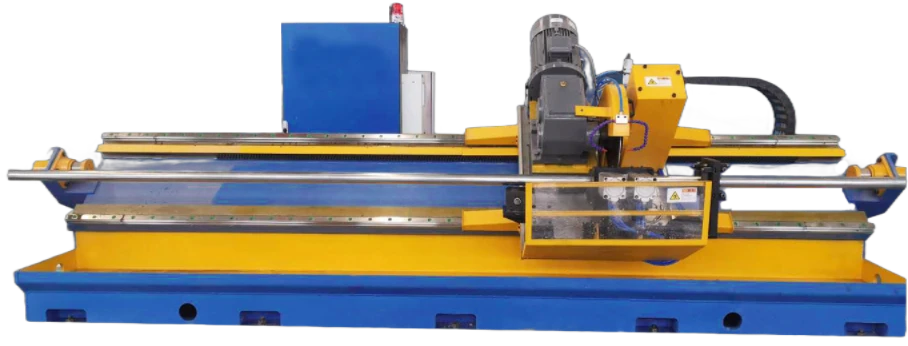Efficient Metal Roll Forming Solutions for Versatile Manufacturing Applications
Understanding Metal Roll Formers A Comprehensive Overview
Metal roll forming is an essential manufacturing process used to create a variety of structural components in different industries. This technique involves the continuous bending of a long strip of sheet metal into a desired cross-sectional profile. The machinery that performs this task is known as a metal roll former. In this article, we will explore the workings of metal roll formers, their benefits, applications, and the considerations for selecting the right one for your needs.
What is a Metal Roll Former?
A metal roll former consists of a series of rollers arranged in sequence, each designed to gradually bend the metal strip into a specific shape. The process begins with a flat sheet of metal fed into the machine, often made from materials like steel, aluminum, or other metal alloys. As the sheet passes through the rollers, it undergoes continuous bending until it emerges as a finished product.
The design of the roll former is tailored to the specific profile being produced. Some common shapes include channels, angles, and Z- or C-sections. Advanced roll formers can create complex shapes and eliminate various manufacturing processes by producing the final product in one go.
Benefits of Metal Roll Forming
1. Efficiency One of the primary advantages of metal roll forming is its efficiency. This continuous process can produce large quantities of parts in a relatively short amount of time, making it ideal for high-volume production runs.
2. Material Utilization Roll forming minimizes material waste. By accurately shaping the metal strip, less material is required compared to other processes, such as stamping, which may lead to more scrap.
3. Versatility Metal roll formers can produce a wide array of profiles and shapes. This versatility makes them suitable for various applications across different industries, from construction to automotive and beyond.
4. Strength and Durability Products manufactured through roll forming tend to have superior strength and durability due to the way the metal is deformed. The process cold-works the material, enhancing its mechanical properties.
5. Consistency and Precision Roll forming allows for high levels of precision in the production of metal components. The machinery can produce parts that are uniform in size and shape, which is crucial for applications requiring tight tolerances.
Applications of Metal Roll Forming
Metal roll forming is utilized across multiple sectors, including
metal roll former

- Construction It is commonly used to create structural components such as purlins, beams, and wall panels. The process allows for the production of lightweight yet strong framing solutions.
- Automotive Roll forming is crucial in the manufacture of parts like door frames, chassis components, and various interior and exterior trim elements, where strength and lightweight design are essential.
- HVAC Metal roll formers produce ducts and other components used in heating, ventilation, and air conditioning systems. The high precision of roll formed parts ensures a proper fit and reduces energy loss.
- Electronics Components such as brackets, housings, and connectors for electronic devices often originate from roll forming processes due to the precision and repeatability required.
Selecting the Right Metal Roll Former
When considering a metal roll former, several factors must be taken into account
1. Material Compatibility Ensure the roll former can handle the type of metal you intend to use, including its thickness and width.
2. Profile Complexity Assess the complexity of the profiles you aim to produce. Some machines are designed for simple shapes, while others can accommodate more intricate designs.
3. Production Volume Determine the expected production volume. High-output jobs may require more robust machinery with higher speeds and capabilities.
4. Cost High-quality metal roll formers can be a significant investment. It is essential to balance upfront costs with long-term efficiency and productivity gains.
5. Support and Maintenance Consider the manufacturer's reputation for customer support and the availability of maintenance services, as roll forming machinery requires regular servicing to maintain optimal performance.
Conclusion
Metal roll formers play a pivotal role in modern manufacturing, offering efficiency, versatility, and precision. As industries continue to evolve, the demand for high-quality metal components will only increase, making the metal roll forming process an indispensable part of the production landscape. Understanding the fundamentals of roll forming can help businesses leverage this technology to enhance productivity and deliver superior products. Whether in construction, automotive, or any other sector, the right metal roll former can pave the way for innovation and success.
-
High Frequency Straight Seam Welded Pipe Production Line-BzZhou Xinghua Machinery Equipment Manufacturing Co., LTD.|line pipe steel&welded gas pipeNewsJul.30,2025
-
High Frequency Straight Seam Welded Pipe Production Line-BzZhou Xinghua Machinery Equipment Manufacturing Co., LTD.|High Precision&Automated SolutionsNewsJul.30,2025
-
High Frequency Straight Seam Welded Pipe Production Line - BzZhou Xinghua Machinery Equipment Manufacturing Co., Ltd.NewsJul.30,2025
-
High Frequency Straight Seam Welded Pipe Production Line-BzZhou Xinghua Machinery Equipment Manufacturing Co., LTD.|Precision Welding, High EfficiencyNewsJul.30,2025
-
High Frequency Straight Seam Welded Pipe Production Line|BzZhou Xinghua|Precision Welding&EfficiencyNewsJul.30,2025
-
High Frequency Straight Seam Welded Pipe Production Line - BzZhou Xinghua|Precision Engineering&EfficiencyNewsJul.30,2025


